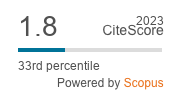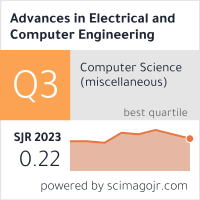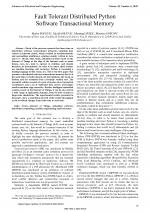| 4/2020 - 3 |
Fault Tolerant Distributed Python Software Transactional MemoryPOPOVIC, M. |
| Extra paper information in |
| Click to see author's profile in |
| Download PDF |
Author keywords
Internet of Things, embedded software, distributed computing, parallel programming, fault tolerance
References keywords
memory(29), transactional(28), distributed(23), software(18), systems(10), computing(9), kordic(8), python(7), romano(5), architecture(5)
Blue keywords are present in both the references section and the paper title.
About this article
Date of Publication: 2020-11-30
Volume 20, Issue 4, Year 2020, On page(s): 19 - 28
ISSN: 1582-7445, e-ISSN: 1844-7600
Digital Object Identifier: 10.4316/AECE.2020.04003
Web of Science Accession Number: 000594393400003
SCOPUS ID: 85098215196
Abstract
Much of the previous research has been done on distributed software transactional memories targeting data centers in Internet clouds, which resulted in nondeterministic and nonrealtime middleware solutions mainly written in Java and C++. On the other hand, embedded systems based on the Internet of Things at the edge of the Internet, such as smart homes, cars, etc., need to operate in realtime, and should, therefore, be deterministic. In order to be smart, these systems use machine learning, and nowadays Python is becoming a leading language in this venue, too. This is the first paper that presents a distributed software transactional memory that is at the same time: (i) fault tolerant, (ii) deterministic, (iii) based on Python, and (iv) extended from a formally verified root. The presented solution consists of a pair of master-slave transaction coordinators and a set of replicated data servers and targets small-to-medium edge networks. Besides intelligent embedded systems, based on the Internet of Things, it can be also used in a wide range of application domains, from SCADA systems to large-scale simulations. The experimental results, presented in the paper, show a superlinear growth of the system throughput as the workload changes from write-only to read-only. |
| References | | | Cited By |
Web of Science® Times Cited: 1 [View]
View record in Web of Science® [View]
View Related Records® [View]
Updated 2 days, 6 hours ago
SCOPUS® Times Cited: 4
View record in SCOPUS® [Free preview]
View citations in SCOPUS® [Free preview]
[1] DPSTM-PS Based Edge Network with MicroPython Based IoTs, Popovic, Marko, Djukic, Miodrag, Basicevic, Ilija, Popovic, Miroslav, 2023 31st Telecommunications Forum (TELFOR), ISBN 979-8-3503-0313-1, 2023.
Digital Object Identifier: 10.1109/TELFOR59449.2023.10372679 [CrossRef]
[2] Formal Verification of Distributed Master-Slave Finite State Machine, Popovic, Marko, Marinkovic, Vladimir, Djukic, Miodrag, Popovic, Miroslav, 2021 29th Telecommunications Forum (TELFOR), ISBN 978-1-6654-2585-8, 2021.
Digital Object Identifier: 10.1109/TELFOR52709.2021.9653241 [CrossRef]
[3] Distributed Python Software Transactional Memory Supporting Publish-Subscribe Pattern, Popovic, Marko, Kordic, Branislav, Basicevic, Ilija, Popovic, Miroslav, 2022 30th Telecommunications Forum (TELFOR), ISBN 978-1-6654-7273-9, 2022.
Digital Object Identifier: 10.1109/TELFOR56187.2022.9983693 [CrossRef]
[4] Obstruction-Free Distributed Transactional Memory, Ramos, Jerônimo, Du Bois, Andre Rauber, Cavalheiro, Gerson, Proceedings of the XXVII Brazilian Symposium on Programming Languages, ISBN 9798400716287, 2023.
Digital Object Identifier: 10.1145/3624309.3624316 [CrossRef]
Disclaimer: All information displayed above was retrieved by using remote connections to respective databases. For the best user experience, we update all data by using background processes, and use caches in order to reduce the load on the servers we retrieve the information from. As we have no control on the availability of the database servers and sometimes the Internet connectivity may be affected, we do not guarantee the information is correct or complete. For the most accurate data, please always consult the database sites directly. Some external links require authentication or an institutional subscription.
Web of Science® is a registered trademark of Clarivate Analytics, Scopus® is a registered trademark of Elsevier B.V., other product names, company names, brand names, trademarks and logos are the property of their respective owners.
Faculty of Electrical Engineering and Computer Science
Stefan cel Mare University of Suceava, Romania
All rights reserved: Advances in Electrical and Computer Engineering is a registered trademark of the Stefan cel Mare University of Suceava. No part of this publication may be reproduced, stored in a retrieval system, photocopied, recorded or archived, without the written permission from the Editor. When authors submit their papers for publication, they agree that the copyright for their article be transferred to the Faculty of Electrical Engineering and Computer Science, Stefan cel Mare University of Suceava, Romania, if and only if the articles are accepted for publication. The copyright covers the exclusive rights to reproduce and distribute the article, including reprints and translations.
Permission for other use: The copyright owner's consent does not extend to copying for general distribution, for promotion, for creating new works, or for resale. Specific written permission must be obtained from the Editor for such copying. Direct linking to files hosted on this website is strictly prohibited.
Disclaimer: Whilst every effort is made by the publishers and editorial board to see that no inaccurate or misleading data, opinions or statements appear in this journal, they wish to make it clear that all information and opinions formulated in the articles, as well as linguistic accuracy, are the sole responsibility of the author.





